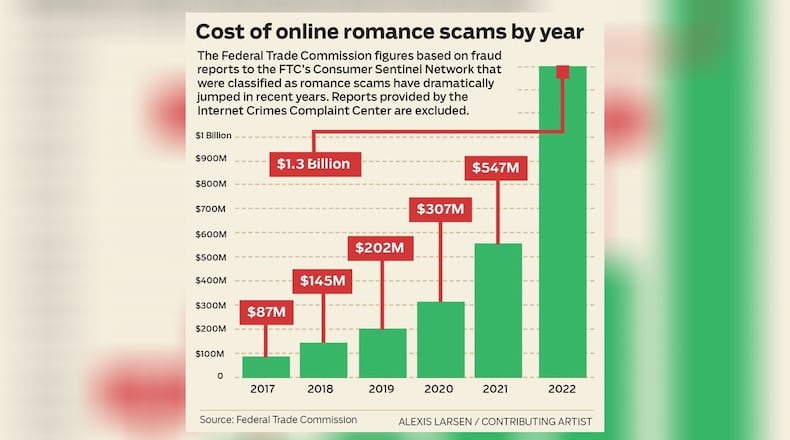“All I know is my mom … went through $150,000 that her father left her when he passed away,” the 58-year-old Gravenstine said. “Between all the troubles she had with the banks, she’s to the point now where no bank will open an account with her for her anywhere. She’s been blackballed.”
Credit: CONTRIBUTED
Credit: CONTRIBUTED
Gravenstine said she discovered her mother was giving large amounts of money away to people she met on social media about the time the COVID-19 pandemic hit in 2020, leaving her mom isolated.
While both mother and daughter lived in Xenia, Gravenstine said she and her daughter — the local family — “kept our distance from her, to say the least, because we were afraid that, you know, we would infect her unknowingly.”
Then a call from a bank in Muncie, Ind. raised red flags, Gravenstine said.
Gravenstine and her mother shared the joint account, and a bank representative said, “mom had been getting checks and she had recently just come in to get a $5,000 check made out to this person I don’t know,” Gravenstine said.
Gravenstine said she learned her mother met people playing online word games. Gravenstine said she cancelled the check, but that didn’t stop her mother’s efforts, which have continued into 2024.
‘Mom got really in deep’
After telling her mother about her actions with the bank check, Gravenstine said her mother was angry. “She went into the bank, stormed in there.”
Her mother got two checks from separate accounts that combined ranged from $30,000 to $50,000 to be sent for her social media friends before her mother closed both accounts, the daughter said.
Eventually, Gravenstine said, “things started snowballing and mom got really in deep.”
Gravenstine said her mother was communicating with at least two men on various digital apps and by phone. She never learned their actual identities.
“All we know is that they have very heavy accents,” she said.
Gravenstine said one claims to be retired four-star Army Gen. Austin Scott Miller, who served as the top commander of the American and NATO forces in Afghanistan.
Stars and Stripes reported in 2021 that the Department of Defense identified more than 900 fake accounts posing as Miller on social media sites attempting to defraud people. “Gen. Miller does NOT use public accounts on social media. Scammers are using his likeness & photos,” the media outlet quotes a military official as saying on Twitter.
Gravenstine’s mother believes what these individuals tell her, remains in contact with them and “she’s engaged to one of them,” despite never meeting in person, Gravenstine added.
That’s a common ploy in romance scams, according to the Internet Crime Complaint Center, or IC3, which is run by the FBI.
“The scammer’s intention is to establish a relationship as quickly as possible, endear himself to the victim, and gain trust,” IC3′s website states. “Scammers may propose marriage and make plans to meet in person, but that will never happen. Eventually, they will ask for money.”
Despite her lack of access to bank accounts, Gravenstine said her mother has been resourceful in continuing to provide these individuals money, such as “finding” large sums of cash in her home and buying gift cards.
“My mom is very intelligent,” she said. “She was still having people behind my back, take her to the grocery store, and cash her checks, and then sending them money and gift cards.”
Gravenstine said she has contacted local police, Greene County Adult Protective Services and the Ohio Attorney General’s Office.
Aiding ‘vulnerable parents’
Area prosecutors contacted about romance scams said the cases can be complex, extremely difficult to prosecute because they operate in cyberspace and identifying them can be next to impossible.
Butler County has a community outreach director to help potential victims, Prosecutor Michael Gmoser told this news organization.
“In situations where community members suspect that their vulnerable parents are being victims of a romance scam, (the outreach director) is able to meet with the potential victim and explain what is really happening,” according to Gmoser.
Gravenstine said they had to sell her mother’s home to avoid foreclosure.
“It’s a nightmare,” she said. “It doesn’t even sound real. It sounds like some bogus made-up story that couldn’t even possibly happen.”
Gravenstine said she now has guardianship of her mother, who has her own apartment.
“I have some control,” she said. “And she’s giving me some of that control voluntarily, though she’s very angry. She’s very resentful about it.
“People need to be aware of what their loved ones are doing,” Gravenstine added. “They’re lonely, they’re bored. They’re not stupid about the phones and the computers. They just don’t understand what people out there are willing to do to get to their money.”
Avoiding romance scams
· Be careful what you make public online. Scammers use details on social media and dating sites to better target you.
· Research the person’s photo and profile using online searches to see if the image, name or details appear elsewhere.
· Go slowly and ask lots of questions.
· Beware if the individual seems too perfect or quickly asks you to leave a dating service or social media site to communicate directly.
· Beware if the individual attempts to isolate you from friends and family, or requests inappropriate photos or financial data that could be used to extort you.
· Beware if the individual promises to meet in person but then always comes up with an excuse. If you haven’t met the person after a few months, for whatever reason, you have good reason to be suspicious.
· Never send money to anyone you have only communicated with online or by phone.
Source: FBI Internet Crime Complaint Center.
About the Author


